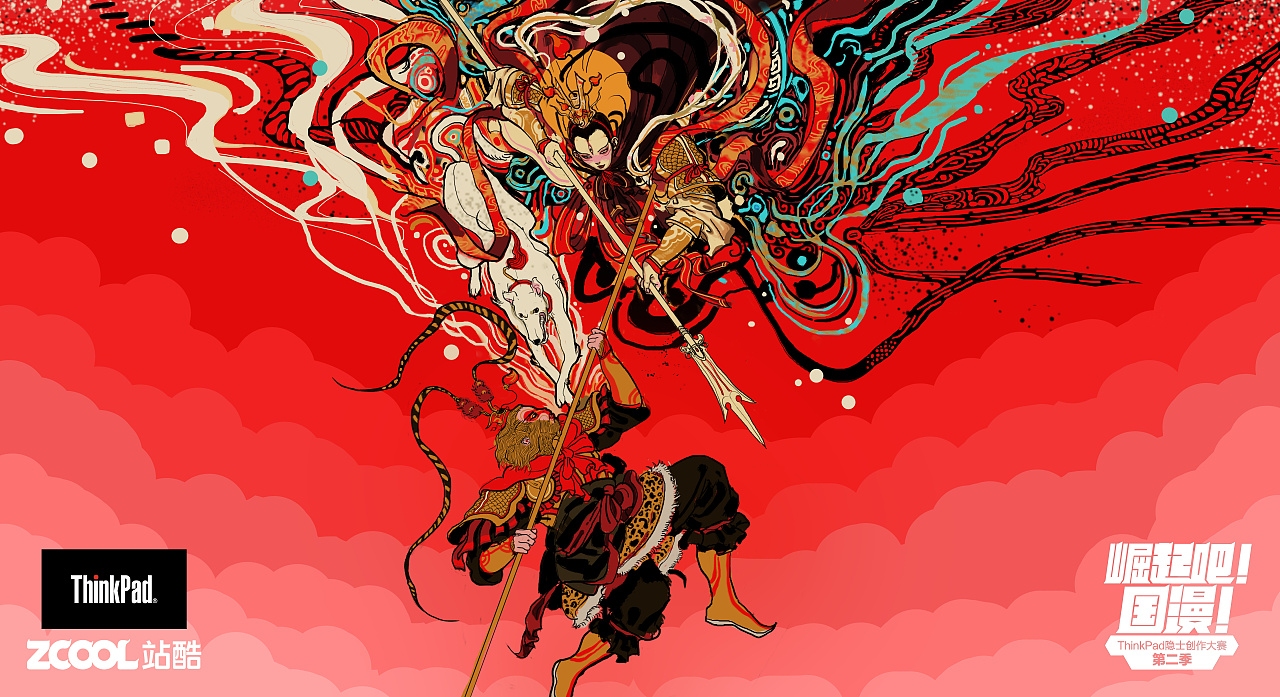“Barbaric monkey!” exclaimed the Immortal Master. “How dare he claim a title of Equaling Heaven?”
“Quit admiring and go challenge him,” the Plum Mountain brothers said.
Seeing the Immortal Master, the little monkeys guarding the camp quickly went to report. The Monkey King pulled out the Gold-Banded Staff, donned his golden armor, pulled on the cloud-walking shoes, adjusted his purple-gold helm, and flew through the camp gate to see an elegantly dressed noble youth.
He had a delicate face and a noble air, dangling earlobes1 and a shining gaze. On his head he wore a three peak phoenix cap; on his body a light yellow goose down robe.2 He wore gilt-embroidered boots, coiled dragon socks, and a jade belt adorned with eight embroidered designs.3 A crescent moon pellet bow swung from his waist.4 His hand grasped a three-pronged double-edged glaive. To rescue his mother he cleaved Peach Mountain in two with his axe; he shot two phoenixes in a tree with a single pellet. Executing eight demons only increased his fame; leading the righteous band of seven Immortals of Plum Mountain. So proud he doesn’t recognize his family in Heaven, instead he lives by the Guan River. The hero of Chicheng City5 with limitless forms is Erlang.
Chicheng City
The text here is 赤城, 赤 means Red, and 城 means city. So why not translate it as Red City? Short answer – English does not translate that way. The capital of China (北京) literally means “North Capital”, but rather than translate the meaning, it is transliterated instead. Nanjing (南京), being the occasional capital of China throughout history, means South Capital. Tokyo (东京) is East Capital. So why not just Chicheng then? Well, without contextual knowledge, how is the English speaker to know that it’s a city?

Seeing him, the Great Sage grinned. Raising his gold-banded staff he called out: “Little general, where did you come from, that you have the guts to challenge me?”
The Immortal Master replied, “Are there no eyeballs in those sockets, that you don’t recognize me? I am the Jade Emperor’s nephew, the Bright Spirit King Erlang! I have been ordered here to capture you, you havoc-wreaking stable boy.6 You should be begging for mercy instead of shooting off your mouth!”7
The Great Sage said, “I seem to recall that the Jade Emperor’s younger sister had married a mortal man named Yang. She bore a boy who split Peach Mountain with an axe. So that was you? I was going to insult you, but it seems I have no quarrel with you. I’ll save you a blow from my staff and spare your life. Rich pretty boy,8 go back in and bring out your Four Heavenly Kings.”
The Immortal Master was furious. “Arrogant monkey! Have a taste of my blade!”

The Great Sage dodged the attack and quickly raised his gold-banded staff to return blow for blow. These two – what a fight!9 The Righteous Hero, Immortal Erlang and the Great Sage Sun, Equal to Heaven. This one proudly making an enemy of the Handsome Monkey King; the other crushing even unknown stalwart foes. At this sudden meeting, both were eager for the fight. Neither knew which would come out on top, on this day both would learn who was the better man.10 The iron staff raced like a dragon; the magic blade danced like a phoenix blocking left and striking right, receiving in front and flashing behind. On one side the six Plum Mountain brothers cheered the fight on, on the other the four Advisors passed orders to the troops. Flags waved and drums beat as one; rallying shouts and rumbling gongs increased excitement for all. The two steel blades wove here and there leaving no seam in their defenses. The ocean’s treasure, the gold-banded staff, seeking victory with speed and transformations. A little pause and you could lose your life! A tiny lapse and your luck could run out!
1 a reference to Buddhist images. Do your ears hang low? ↩
2 Goose down armor? ↩
3 Both Buddhism and Daoism have symbols in sets of eight, and this may refer to one of those. ↩
4 I’d never heard of this weapon before, but it looks like a bow and works like a slingshot. ↩
5 According to Dr. Yu, a cult worshipping Erlang originated here. ↩
6 text actually says wreaked havoc in heaven horses’ fortune macaque. That number of adjectives actually works in Chinese. ↩
7 Actually says, and you still don’t know life from death. ↩
8 Wukong is saying that he is of an older generation than Erlang. Unclear if this is true. ↩
9 Woot woot more fight scenes as poetry. ↩
10 lit. Before, neither knew the meaning of shallow or deep. On this day each learned the truth of light and heavy. ↩

One thought on “Journey to the West – Chapter 6.3”